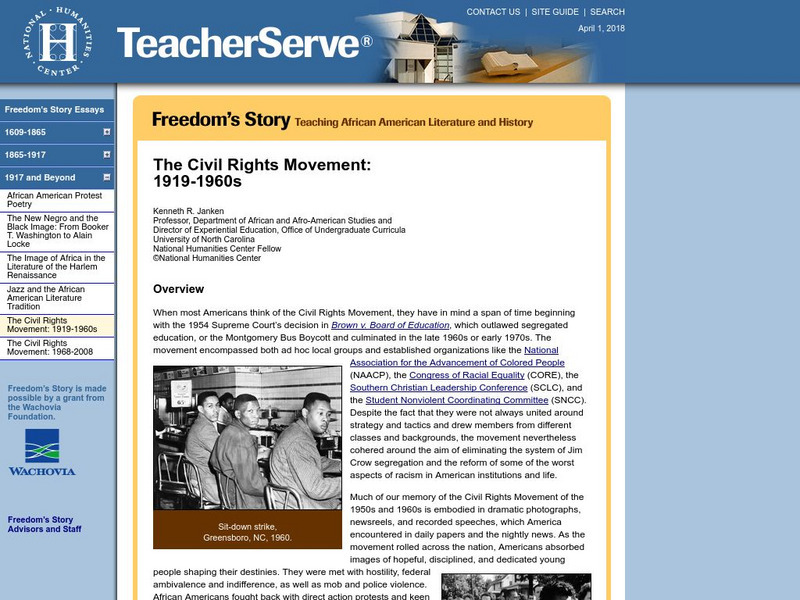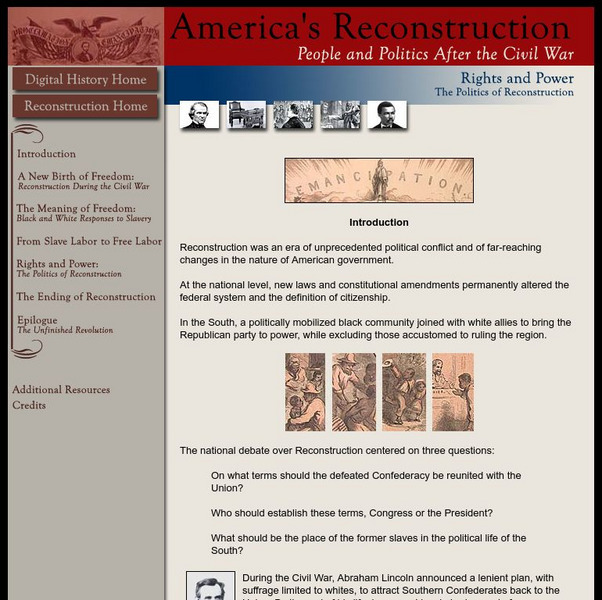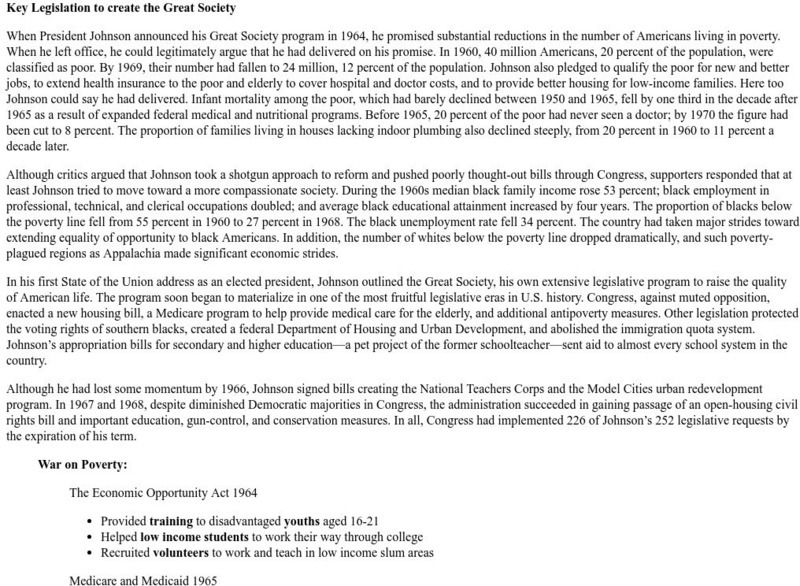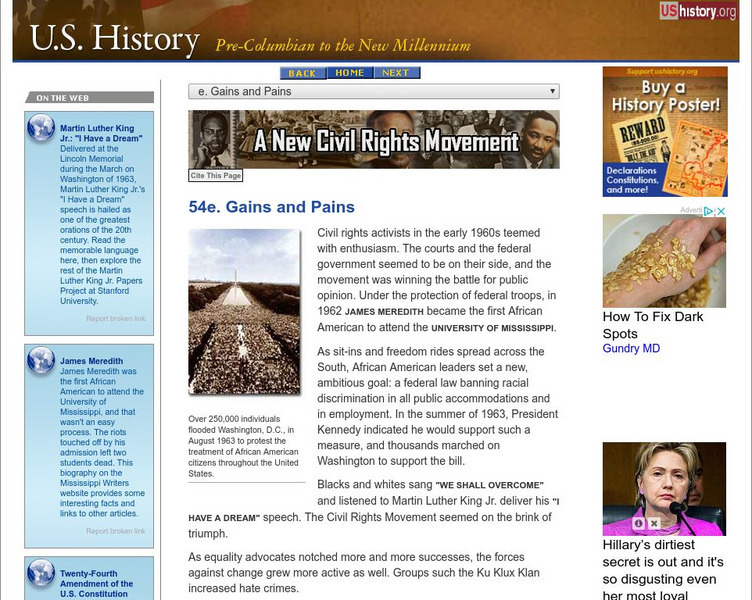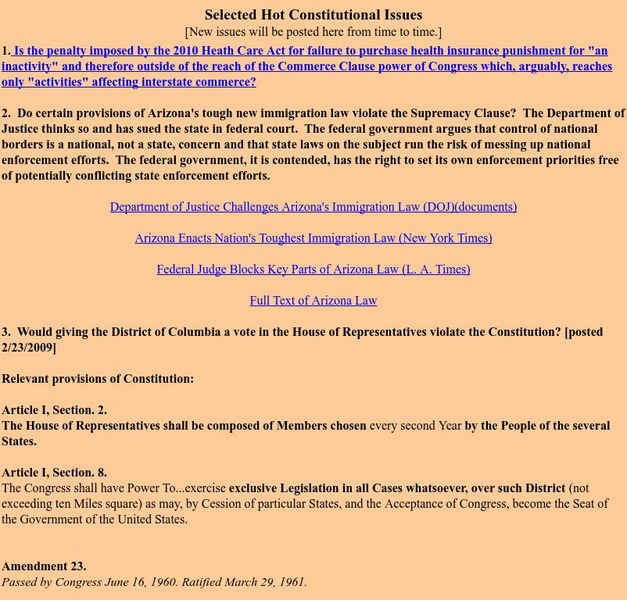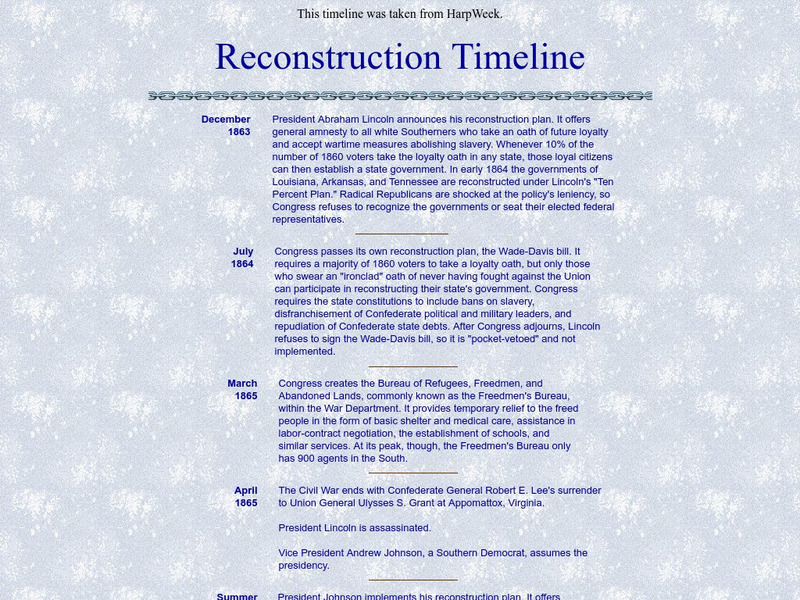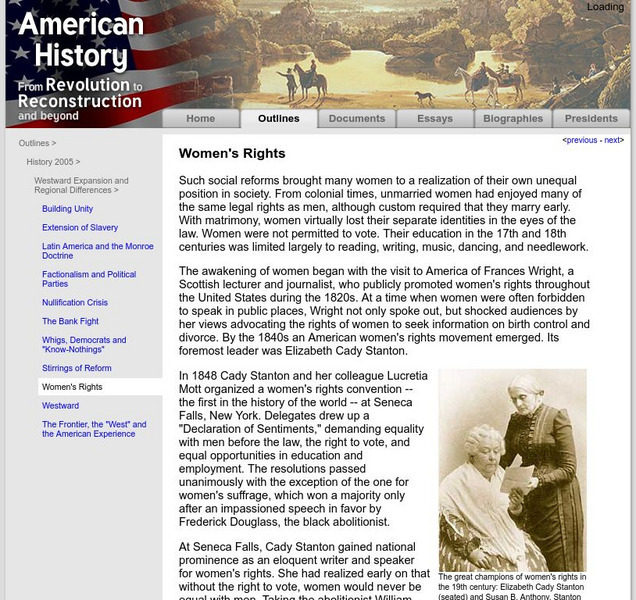National Humanities Center
National Humanities Center: Teacher Serve: The Civil Rights Movement: 1919 1960s
Article provides an overview of the Civil Rights Movement in America between 1919 and the 1960s with detailed discussion on racial equality, nonviolence and passive resistance, and segregation.
Raleigh Charter High School
Mrs. Newmark's Page: Civil Rights
This interactive activity focuses on the Civil Rights Movement.
Digital History
Digital History: America's Reconstruction: Rights and Power
This resource provides information about Reconstruction, the United States Government, slavery, and civil rights.
Other
Weber State: Key Legislation to Create the Great Society
Read about President Lyndon Johnson's vision for a more compassionate America, one that offered educational and housing opportunities, protected the envrionment, and cared for the nation's seniors. Find a list of the legislation passed...
PBS
Pbs Learning Media: Martin Luther King Jr.: Civil Rights Leader
Students will explore how King's deep-seated commitment to nonviolence contributed to the expansion of social justice in the United States, particularly for African Americans.
The National Alliance on Mental Illness
Nami: Maine Upholds Voting Restrictions
This article discusses how Maine has upheld certain voting restrictions for the mentally ill.
Independence Hall Association
U.s. History: Gains and Pains
Read about the legal gains made by the civil rights movement, including the Civil Rights Act of 1964, juxtaposed against the real-life actions meant to deny African Americans their right to racial equality not just legally, but...
Digital History
Digital History: The Great Society and the Drive for Black Equality
Read about President Lyndon Johnson's vision for the Great Society. See how the programs instituted were focused on lifting the poor from poverty, especially African Americans. Included were laws to increase civil rights and voting...
University of Missouri
Exploring Constitutional Conflicts: Select Hot Constitutional Issues
Among other issues considered, Hot Constitutional Issues probes into the constitutionality of giving Washington, D.C. a vote in the House of Representatives, raised in 2009.
Gilder Lehrman Institute of American History
Gilder Lehrman Institute: History Now: Securing the Right to Vote: Selma to Montgomery Story
[Free Registration/Login Required] Lesson plan asking this essential question: "What conditions created a need for a protest march from Selma to Montgomery in 1965 and what did that march achieve?"
Khan Academy
Khan Academy: Ap Us History: 1890 1945: The Age of Empire: The Progressive Era
The Progressive Era from the 1890s to the 1920s evolved as a response to the negative effects of industrialization. Reforms that emerged provided protections for workers and consumers and gave women voting rights. Backlash against the...
Black Past
Black Past: Wilkins, Roy
This encyclopedia entry recounts briefly the life of Roy Wilkins, a very influential civil rights leader.
Center For Civic Education
Center for Civic Education: Becoming a Voter
In this lesson, young scholars apply their state's requirements for registering to vote. Students learn when and how to register, how to complete a voter registration form, and when and how to reregister.
Siteseen
Siteseen: American Historama: Selma March
The Selma Freedom March from Selma to Montgomery, Alabama took place in March 1965 as part of the voting rights movement.
PBS
Pbs Learning Media: Fighting Racism: Civil Rights in the Progressive Era
In this interactive lesson, students take a closer look at some of the women who risked their lives to fight against systemic racism in the United States during the Progressive Era.
Ducksters
Ducksters: Civil Rights for Kids: African American Civil Rights Movement
Kids learn about the history of the African-American Civil Rights Movement including segregation, Jim Crow laws, protests, Martin Luther King, and the passage of the Civil Rights Act on this site.
Independence Hall Association
U.s. History: Alien and Sedition Acts
A great description of the Alien and Sedition Acts, passed by the Federalist Congress in 1798. See how the Federalists tried to hang on to power by restricting voting privileges and infringing on free speech and freedom of the press.
Mount Holyoke College
Mt. Holyoke: Reconstruction Timeline
Here's a concise timeline that highlights the important facets of reconstruction from the announcement of Abraham Lincoln's reconstruction plans to the end of reconstruction at the election of Rutherford B. Hayes.
Digital History
Digital History: Kennedy Finally Acts
For a president, civil rights proved to be a controversial and sensitive issue. During his time in office, President Kennedy had a mixed record on civil rights. He called for stronger civil rights laws yet moved slowly for fear of...
US National Archives
Our Documents: 100 Milestone Documents
A collection of one hundred documents that are significant in shaping the history of the United States, beginning with the Lee Resolution of June 7, 1776, and ending with the Voting Rights Act of 1965.
University of Groningen
American History: Outlines: Women's Rights
Such social reforms brought many women to a realization of their own unequal position in society. From colonial times, unmarried women had enjoyed many of the same legal rights as men, although custom required that they marry early. With...
Digital History
Digital History: The Tumultous 1960's
The decade of the 1960s was a time of protest about the Vietnam War and civil rights, and progressive legislation addressing many problems. Find primary source material, charts, and statistics that cover these topics. Included are...
Victorian Web
Brown University: Victorian Web: The Reform Acts
Information is provided about the Reform Acts along with links to other related sites. The information focuses on the three Reform Acts of 1832, 1867, and 1884 and describes how these acts extended voting rights to previously...
Ducksters
Ducksters: Civil Rights for Kids: Native American Rights
A site investigating the history of Native American Rights from the Indian Removal Act and the Trail of Tears to the Indian Civil Rights Act of 1968.


